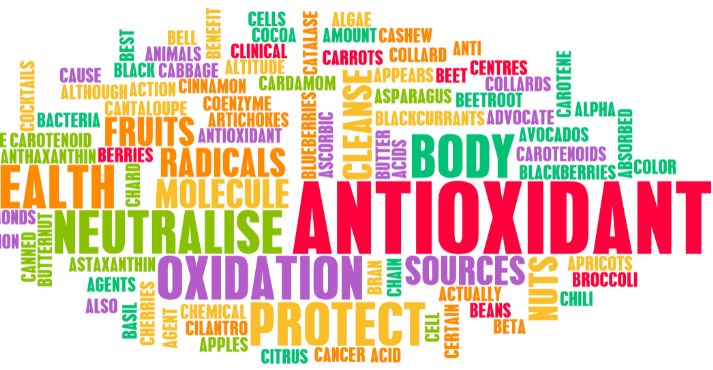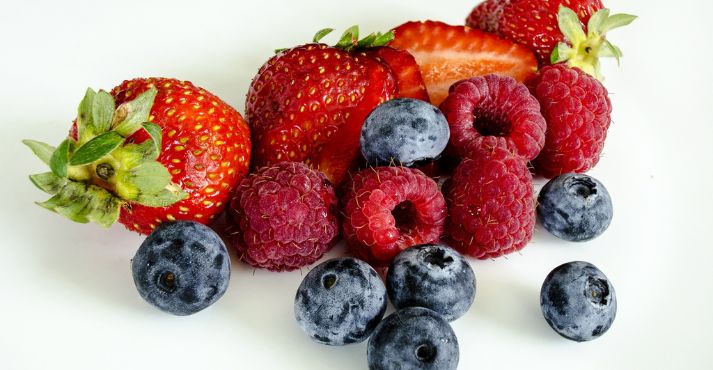Antioxidants serve as the body’s defenders against harmful free radicals, notorious contributors to health conditions such as diabetes and cancer.
Abundantly present in various plant-based foods, essential antioxidants like Vitamin E and C play a pivotal role in this defensive mechanism. While the term “antioxidants” is frequently mentioned, the intricate details of their functions often remain a mystery to many.
This article aims to demystify antioxidants, providing comprehensive insights into their nature, significance, and the mechanisms by which they combat free radicals.
If you’ve been curious about antioxidants, their impact on health, and how they operate, you’re in the right place. This comprehensive guide will unravel the mystery surrounding antioxidants and equip you with a thorough understanding of their crucial role in maintaining well-being.
Understanding Antioxidants

Delve into the world of antioxidants, crucial substances renowned for inhibiting or neutralizing the damaging effects of free radicals. Gain insights into their diverse sources and remarkable ability to safeguard cells from oxidative harm.
Definition of Antioxidants
Antioxidants Unveiled:
Antioxidants are specialized substances that protect our cells from oxidative stress. They defend against free radicals, unstable molecules that can wreak havoc on our cellular structures.
Free Radical Neutralization:
The core function of antioxidants lies in their exceptional capacity to neutralize free radicals. By donating electrons to these unstable molecules, antioxidants effectively prevent them from causing cellular damage and disruption.
Cellular Protection
Guardians of Cell Health:
Antioxidants operate as cellular guardians, shielding our cells from oxidative harm. By mitigating the impact of free radicals, they contribute to the overall well-being of our cells and tissues.
Diverse Sources of Antioxidants:
Antioxidants are not confined to a single source. They can be found in various foods, including fruits, vegetables, nuts, and beverages. This diversity allows individuals to incorporate antioxidants into their diets through various delicious and nutritious options.
Oxidative Damage Prevention
Preventing Oxidative Stress:
Oxidative stress, caused by an imbalance between free radicals and antioxidants, is a precursor to various health issues. Antioxidants are crucial in preventing oxidative stress, reducing the risk of conditions associated with cellular damage.
Cellular Defense Mechanisms:
Our bodies have built-in defense mechanisms, and antioxidants contribute to these by fortifying cells against the damaging effects of free radicals. This cellular defense is vital for maintaining optimal health and well-being.
The Crucial Role of Antioxidants in Keeping Our Cells Healthy
Let’s look closer at antioxidants’ essential job in promoting cellular health, preventing damage, and contributing to overall well-being.
Antioxidants: The Cell’s Guardian
Defending Against Harm:
Think of antioxidants as the superheroes safeguarding our cells. They work tirelessly to neutralize free radicals, the troublemakers that can cause damage to our cells.
Keeping Stress at Bay:
One of their main tasks is to reduce oxidative stress, a condition that could harm our cells. By doing this, antioxidants act like watchful protectors, minimizing the risk of damage.
Promoting Healthy Cells
Providing a Defense Boost:

Antioxidants promote cellular health by providing cells with the necessary defense. It’s like giving our cells an extra layer of protection to thrive.
Building Resilient Cells:
Thanks to antioxidants, our cells become more resilient. They help cells withstand environmental challenges and internal stressors, supporting long-term cellular well-being.
Prevention of Damage
Guarding Cell Structures:
Antioxidants excel at guarding the delicate structures within cells. This means they’re actively working to keep our cellular components intact.
Reducing Health Risks:
By preventing oxidative damage, antioxidants also lower the risk of stress-related health issues. They’re like our cellular health bodyguards, helping maintain overall well-being.
In simple terms, antioxidants are like the body’s defense team, actively keeping our cells healthy and protecting them from potential threats.
Understanding Various Antioxidants
Incorporating various foods with nutrients into your diet is a crucial strategy for ensuring an ample intake of antioxidants. These abundant, potent molecules in various foods are crucial in promoting overall health and well-being.
When we talk about antioxidants, we often refer to vitamins like A, C, and E, essential minerals like selenium and zinc, and a range of beneficial phytochemicals. Each component contributes uniquely to your body’s defense against oxidative stress.
In nutrition, antioxidants play pivotal roles in safeguarding our health. Let’s explore the diverse array of antioxidants, each with distinct benefits.
Vitamin Antioxidants: A, C, E
Vitamin A: Found in foods like carrots, sweet potatoes, and spinach, vitamin A supports vision health and boosts your immune system.
Vitamin C: Abundant in citrus fruits, strawberries, and bell peppers, vitamin C is known for its immune-boosting properties and skin health benefits.
Vitamin E: Nuts, seeds, and vegetable oils are excellent sources of vitamin E, contributing to skin health and acting as a potent antioxidant.
Mineral Antioxidants: Selenium, Zinc
1. Selenium:
Critical for thyroid function, Selenium finds its place in Brazil nuts, seafood, and whole grains.
2. Zinc:
A linchpin for immune health and wound healing, Zinc is generously present in meat, dairy, and legumes.
Phytochemicals: Nature’s Guardians
These natural compounds derived from plants exert potent antioxidant effects.
1. Flavonoids:
Abundant in fruits, vegetables, and tea, Flavonoids contribute significantly to cardiovascular health.
2. Lycopene:
Found in tomatoes, watermelon, and pink grapefruit, Lycopene is associated with a lowered risk of specific cancers.
3. Quercetin:
Present in onions, apples, and berries, Quercetin exhibits anti-inflammatory properties.
Boost Your Health with Antioxidant-Rich Foods
In the quest for a healthier lifestyle, embracing a diet rich in antioxidants is a powerful choice. These health-promoting molecules, found abundantly in various foods, contribute significantly to overall well-being.
Let’s explore some vital dietary sources of antioxidants, emphasizing the importance of a balanced and diverse diet for optimal health.
Dietary Powerhouses of Antioxidants

- Colorful Berries: Berries like blueberries, strawberries, and raspberries are delicious and packed with antioxidants, including flavonoids and polyphenols.
- Vibrant Vegetables: Incorporate a variety of colorful vegetables like kale, spinach, and broccoli into your meals. These veggies boast a range of antioxidants like vitamin C, carotenoids, and other phytochemicals.
- Nutrient-Dense Nuts and Seeds: Almonds, walnuts, and chia seeds are excellent sources of vitamin E and other antioxidants. Snacking on these nutrient-rich options adds a healthy dose to your diet.
- Citrus Fruits: Oranges, grapefruits, and lemons are rich in vitamin C, a potent antioxidant known for its immune-boosting properties.
- Green Tea: A refreshing and healthy beverage loaded with catechins, green tea provides antioxidant benefits. Swap it for your regular cup of tea or coffee.
Building a Nutrient-Dense Diet
Aim for a balanced and nutrient-dense diet to ensure you’re reaping the full benefits of antioxidants. This means incorporating a variety of food groups into your meals.
Include lean proteins, whole grains, fruits, vegetables, and healthy fats in proportions that suit your dietary needs.
Encouraging Healthy Food Choices
Making mindful choices about what you eat is fundamental to a healthy lifestyle. Opt for whole, unprocessed foods whenever possible. Minimize your intake of processed foods high in sugars and unhealthy fats, as they may counteract the positive effects of antioxidants.
Unlocking Health Benefits with Antioxidants
Antioxidants, those mighty defenders found in various foods, offer many health benefits beyond just satisfying your taste buds. Let’s delve into the impressive advantages of incorporating antioxidants into your lifestyle.
1. Reducing Inflammation
Antioxidants are crucial in reducing inflammation, a common culprit behind many chronic diseases. By neutralizing free radicals, these potent compounds help mitigate inflammatory processes in the body, promoting overall well-being.
2. Supporting Immune Function
A robust immune system is your body’s shield against infections and illnesses. Antioxidants, particularly vitamins C and E, contribute to immune system support. Including antioxidant-rich foods in your diet can fortify your body’s defenses, keeping you resilient year-round.
3. Disease Prevention through Antioxidant Intake
Embracing antioxidants is a proactive step toward disease prevention. The oxidative stress caused by free radicals is implicated in various diseases, including heart conditions and certain cancers.
Antioxidants act as guardians, helping to prevent cellular damage and reducing the risk of chronic illnesses.
4. Anti-Inflammatory Effects
Chronic inflammation is linked to a myriad of health issues. Antioxidants, through their anti-inflammatory effects, help manage inflammation levels in the body. This supports joint health and contributes to a lower risk of inflammatory conditions.
How to Maximize Health Benefits:
To unlock the full spectrum of health benefits associated with antioxidants, ensure a diverse and balanced diet. Add a rainbow of fruits, vegetables, nuts, and seeds to your meals.
Consider green tea as a beverage choice, and savor the richness of dark chocolate, known for its antioxidant content.
Safeguarding Health: Antioxidants and Chronic Disease Prevention
Antioxidants are crucial in preventing chronic diseases in the intricate interaction of health and wellness. Let’s explore antioxidants’ profound impact on safeguarding our well-being, supported by compelling scientific evidence.
Cardiovascular Health
Antioxidants exhibit protective abilities when it comes to cardiovascular well-being. By counteracting oxidative stress, they help maintain the delicate balance that keeps our hearts healthy.
Scientific studies highlight the link between antioxidant-rich diets and a reduced risk of heart conditions, emphasizing the importance of these compounds in nurturing cardiovascular health.
Cancer Prevention
In the battle against cancer, antioxidants stand as valuable allies. These compounds found abundantly in fruits, vegetables, and other nutrient-rich foods, showcase cancer-preventive properties.
Scientific evidence suggests that antioxidants neutralize free radicals, mitigating the cellular damage that could lead to the development of cancerous cells.
Neuroprotective Effects
Our brain, the command center of our body, benefits significantly from the protective properties of antioxidants.
The research underscores the neuroprotective effects of antioxidants, showcasing their potential to reduce the risk of neurodegenerative disorders. Incorporating antioxidant-rich foods becomes a strategic move in nurturing cognitive health.
Scientific Evidence on Antioxidants
The scientific community consistently reinforces the crucial role of antioxidants in disease prevention. Rigorous studies underline their ability to combat oxidative stress, offering a shield against chronic diseases that affect our modern lives.
From peer-reviewed journals to clinical trials, the evidence supporting the positive impact of antioxidants on health is robust and compelling.
Conclusion
In conclusion, the significance of antioxidants in maintaining cellular health and preventing diseases cannot be overstated. These health-promoting compounds, exemplified by Vitamin E and C, are pivotal in neutralizing free radicals linked to conditions like diabetes and cancer.
The key takeaway is clear: incorporating antioxidant-rich foods into your diet is not just a dietary choice but a strategic step toward reinforcing cellular health and preventing diseases.
As we wrap up our insights on antioxidants, we must emphasize the enduring importance of a balanced lifestyle, where these protective agents contribute to overall well-being.
The future of antioxidant research promises continued revelations that will further illuminate their role in maintaining optimal health.
So, in concluding our exploration, let’s embrace the power of antioxidants as we navigate the path to a healthier and disease-resistant future.





























